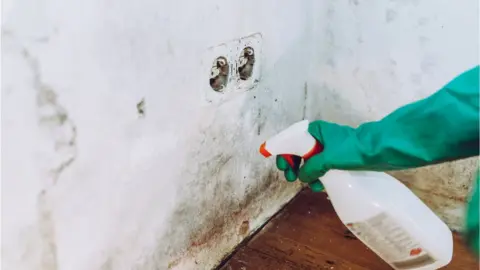Black mould: Rhyl councillor blames residents for problem
 Getty Images
Getty ImagesA councillor has appeared to blame social housing tenants for black mould.
Denbighshire council was holding a meeting on the issue after the death of two-year-old Awaab Ishak in Rochdale in 2020, caused by exposure to mould.
Councillor Ellie Chard claimed some residents did not open windows properly, and said managing the problem was "common sense".
But a top council officer told councillors the management of mould was "a very complex issue".
The issue was discussed as a report was presented to councillors on how the county's households are dealing with damp and mould.
"I do know housing officers - especially around Bruton Park [housing estate] - they know the residents who don't open their windows, they don't do this, they don't do that," said Rhyl councillor Ms Chard.
"They probably don't fill their bins the right way either," she added, according to the Local Democracy Reporting Service.
 Family handout
Family handoutThe council is scrutinising its procedures after the Welsh government sought assurances from all social landlords in December on how they were responding to the death of Awaab Ishak.
Geoff Davies, the council's lead officer for community housing, said: "It is a very complex issue. There is quite a bit of science behind mould and condensation.
"It doesn't necessarily mean a building defect... it is all about how humidity is managed in a property.
"Older houses are more likely, because of their energy performance, to suffer mould and condensation compared to a lot of newer houses."
Mr Davies added: "The standard response is usually open a window, but that could make a house even colder and if a house is too cold, that is absolutely the condition for condensation.
"So the challenge is getting the advice to the right people and support around absolutely making sure there isn't a building defect."
'It's common sense, isn't it?'
Mr Davies went on to explain it was sometimes difficult to speak to tenants as some residents immediately felt they were being blamed, while others refused council staff access to their homes.
He also warned of the dangers of drying clothes on radiators, and said the first job when damp was reported was to make sure there was not a leak.
Ms Chard added: "I'd like to thank you all for the checklist because, basically, it's common sense, isn't it?"
Councillors were told residents who reported an issue with damp, mould, or condensation will be asked for feedback on the effectiveness of the council's advice.
